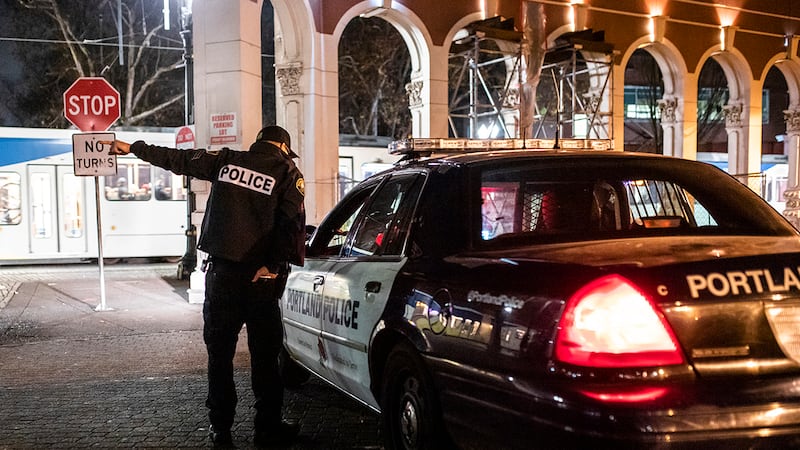If you want to understand the costs of Portland's police and fire bureaus, look at the clothes they wear.
The Portland Police Bureau's dress blues? The cops have a full-time, civilian employee to distribute those uniforms, badges and other equipment. That person is called the quartermaster, with an annual salary PPB declined to reveal.
Portland Fire & Rescue has its own uniform-minder: a sworn firefighter whose job it is to make sure that the "turn-outs," as firefighters call their uniforms, fit properly and meet safety standards. Salary: $115,530. (PF&R spokesman Lt. Rich Chatman says the position is held by a sworn officer for safety reasons. "Firsthand knowledge of the clothing and safety gear that our firefighters will be wearing inside a fire is important," Chatman says.)
This tale of two uniform managers is an example of the ways in which the city's biggest public safety bureaus run shops that are in some ways mirror images.
Both bureaus, for example, employ their own accounting, personnel, IT, training and recruiting and records staffs and vehicle mechanics, although the city also has a large, centralized fleet operation.
Tom Rinehart, the city's chief administrative officer, says that's a problem.
"We have duplicative programs and positions," says Rinehart, "That is clear."

It's budget season in City Hall, and despite the booming economy and growing population, the cost of government—mostly salaries and benefits—continues to grow faster than the money flowing in.
When Mayor Ted Wheeler laid out his budget priorities for 2020-21, in a letter to bureau directors late last year, his top priority was the homeless crisis.
Behind that, Wheeler ranked what he calls a "collaborative safety budget."
The target: back office functions in the city's four public safety bureaus, police, fire and the Bureaus of Emergency Management and Emergency Communications, which collectively account for about 61 percent of the city's discretionary budget. Wheeler's savings goal: 2 percent of public safety expenditures, or $7 million, phased in over three years.
The big targets are police and fire, the biggest line items in a discretionary budget expected to total $584 million in 2020-21.
The services both bureaus provide often overlap and increasingly consist of responding to calls from or about people experiencing homelessness. Yet the bureaus largely set budgets and staff themselves as if they existed in a vacuum—"siloing," in City Hall parlance.
City Commissioner Jo Ann Hardesty says finding ways for the bureaus to function more efficiently is a top priority.
"When I was elected, I promised Portlanders I would not work in my silos," she says. "We need to look at public safety bureaus as a holistic system. When people call 911, they expect to receive help from the right first responders, and this is the first step toward making sure we streamline our system and resources."
When public budget talks begin March 2, most of the noise will surround the city's contract with its police union—with heated if familiar questions about how its members respond to the mentally ill.
The discussion of combining bureau budgets to eliminate waste probably won't be as fraught. But it's a recognition by Wheeler, Hardesty and others of the same reality: The work the public safety bureaus perform has changed dramatically.
Fewer than 1 percent of calls the fire bureau responds to are structure fires, for instance, and about half the calls police respond to involve a person who is homeless. Those changes mean the traditional responses—a fire truck with four sworn officers or an armed police officer—often may not be the most effective.
"In other cities, there's one non-uniformed person in charge of putting together a public safety budget," Rinehart says. "We don't have that here."
Rinehart says no decisions have been made about how many or which positions in which bureaus might be eliminated. (Union officials representing police, fire and civilian employees did not respond to requests for comment.)
Rinehart will present to the Portland City Council as part of a public safety budget session March 19, when he hopes to explain the benefits of better integration of the public safety bureaus.
"The biggest obstacle we have is structural," he says. "People haven't exercised these muscles before. We want them to focus on their core mission rather than individual budgets."

Commission: Impossible
Reimagining city public safety bureau operations is part of a larger debate that will commence in earnest later this year when the Portland City Council names a charter review commission.
That panel will grapple with an increasingly pressing question: whether the city's highly unusual commission form of government makes sense.
Portland is unique among large U.S. cities in employing that form of government, in which bureau directors report to elected commissioners, rather than a professional, unelected city manager.
A 2019 City Club of Portland report said the answer was clear.
"The commission form of local government is organized such that city bureaus are run by commissioners with little, if any, regard to their managerial or subject-matter expertise," the report concluded. "It is inherently inequitable and has long since ceased to be the most effective form of government for Portland."
Currently, the mayor parcels out bureau assignments to city commissioners, which can lead to churn. When Commissioner Jo Ann Hardesty took over Portland Fire & Rescue last year, for instance, she became the third fire commissioner in seven years. "There is little upside to bureau assignments being frequently shuffled among commissioners, or reclaimed en masse by the mayor," the City Club report said. "Especially when used as a bargaining or punitive tool."
